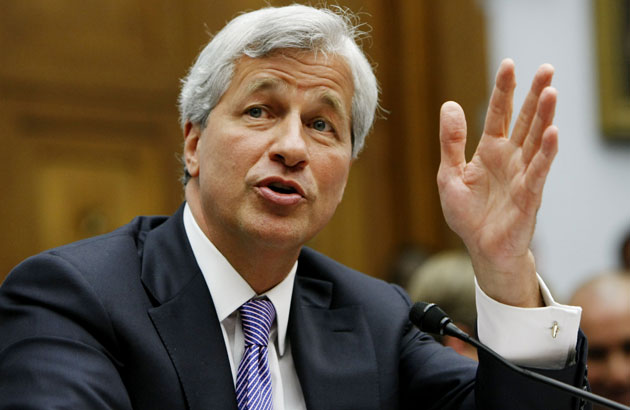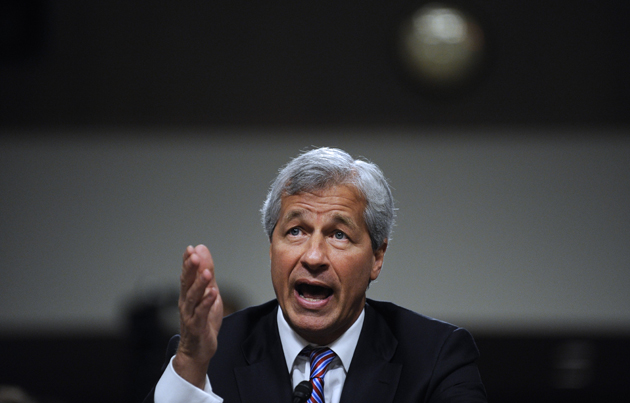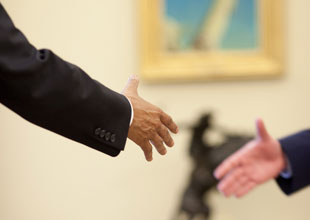
Jamie Dimon, CEO of JP Morgan Chase, testifies in front of the House Financial Services committee. Fang Zhe/Xinhua/Zuma
This story first appeared on the ProPublica website.
JPMorgan Chase CEO Jamie Dimon is on Capitol Hill again today, this time to talk to the House Financial Services committee about the bank’s recent multibillion-dollar trading loss. According to his prepared testimony, Dimon plans to deliver basically the same remarks he gave the Senate banking committee last week, apologizing but giving few details.
His Senate hearing was hardly a grilling; senators mostly praised him for his “emphasis on continuous quality improvement,” in the words of Senator Jim DeMint, R-S.C.
As we charted last week, JPMorgan happens to have plenty of connections to the Senate committee. The House committee where Dimon is appearing today has its own ties to the bank. Congressmen and staff from the committee have gone to JPMorgan and its lobbying firms. Members have also gotten hefty campaign contributions from the bank’s PACs and employees.
The House Connections
JPMorgan has two in-house lobbyists with connections to the House Financial Services committee.
- Rick Lazio joined JP Morgan in 2004 as chief of government relations. He previously served as a congressman from New York from 1993-2000, and sat on the committee.
- Tom Koonce is a lobbyist for JP Morgan and formerly a legislative director for Brad Miller, D-N.C., who sits on the committee.
There are also three former congressional staffers with committee ties at firms currently lobbying for JPMorgan:
- Collins Lionel is a lobbyist at Jones, Walker et al., and a former staff member on the committee. JPMorgan hired the firm this year.
- Nicholas Leibham, who works JPMorgan lobbying firm K&L Gates, was formerly an aide to Gary L. Ackerman, D-N.Y., another committee member.
- Bart Gordon also works at K&L Gates. He’s a former Democratic congressman from Tennessee who, back in the 1980s, sat on the committee.
Data compiled by the Center for Responsive Politics also shows how representatives on the committee have benefited from the generosity of JPMorgan’s employees and PACs.
In the 2012 election cycle, JPMorgan’s PACs and employees have so far given $168,000 to members of the committee. About 80 percent of that came from one of the bank’s PACs.
- JPMorgan’s PAC and employees have been the second-largest contributors to committee chairman Spencer Bachus, R-Ala., since 1993, donating a total of $119,000 to the congressman’s campaigns — $11,000 so far this election cycle. (These numbers don’t include contributions to Super PACs or other outside groups.)
- The committee’s vice-chair, Jeb Hensarling, R-Texas, has received a relatively modest $50,000 from JPMorgan since 2003. Overall, commercial banks have been his largest campaign contributor.
- Other big Republican career recipients include Steve Stivers of Ohio, who has only served since 2010 but has already received more than $70,000.
- On the Democratic side, JPMorgan’s PAC and employees have given ranking member Barney Frank, D-Mass., $84,500 since 1989, making them his 4th biggest donor overall.
- JPMorgan is number one for Carolyn Maloney, D-N.Y., with more than $100,000 since 1993.
Despite the hearings, neither the House nor Senate is actually conducting investigatons of JPMorgan’s losses. But the Department of Justice is, along with five of JPMorgan’s regulators — the FDIC, SEC, CFTC, OCC and the Fed. Lest you find that load of government acronyms as bewildering as Dimon said he did, we’ve also laid out their various investigations, and in a few cases, their own JP Morgan connections.
The SEC
The Securities and Exchange Commission is looking into how JPMorgan disclosed risks to shareholders. SEC chairman Mary Schapiro outlined in testimony to the House today the various kinds of disclosure the SEC can target, without going into details on JPMorgan.
JPMorgan has two former SEC enforcement heads working for them now: the company’s general counsel is Steven Cutler, who headed enforcement at the SEC from 2001 to 2005. They have also reportedly retained William McLucas from an outside law firm, another SEC enforcement director who spent two decades at the agency.
The CFTC
The Commodity Futures Trading Commission is flexing new muscles gained from the Dodd-Frank financial reform. According to the Wall Street Journal, they are subpoenaing internal bank emails to determine if JPMorgan officials made deceptive statements — something that could constitute fraud or manipulation of derivatives market. The CFTC has never brought charges under the new rules, which went into effect last year.
The OCC
The Office of the Comptroller of the Currency director’s testimony for today echoes what he told the Senate earlier this month. The agency is looking at JPMorgan’s risk-management strategy leading up to the losses, and reviewing the OCC’s own oversight of the bank.
As ProPublica’s Jesse Eisinger wrote recently, this is also something of a test for the OCC under its new commissioner Thomas Curry. The agency has had a reputation for favoring light regulation — including a watered-down version of the Volcker Rule, a Dodd-Frank ban on proprietary trading that some say would stop trades like the one that led to JP Morgan’s loss when it goes into effect. Curry cautioned in his testimony for today that the OCC hadn’t determined whether JP Morgan’s trade would have been banned under Volcker.
The Fed
In his testimony, the legal counsel of the Federal Reserve said that the agency was still looking, but had not yet turned up any evidence of weak risk controls at JPMorgan.
Jamie Dimon sits on the board of the New York Federal Reserve — something that’s prompted a proposed bill from Democratic senators that would ban officials of banks that can receive loans from the Fed from serving on any of its boards. JPMorgan and 17 other banks whose execs served on regional Fed boards got emergency loans from the Fed between 2007 and 2009. A government report found no evidence of conflict of interest from the arrangement, but did raise the concern of “reputational risks” from the appearance of one.
The FDIC
The Federal Deposit Insurance Commission chair testified that the FDIC has added extra staff and has “met daily” with JPMorgan employees to take a broader look at the company’s risk management beyond the unit that made the losing trades, according to their prepared testimony.
A recent appointee to the board of the FDIC, Jeremiah Norton, is a former executive at JPMorgan Securities. Before that, he was an aide to Ed Royce, R-Calif., who sits on the House finance committee.
The DOJ
The DOJ isn’t testifying this morning, but they have started an inquiry into what executives at JPMorgan knew when they initially dismissed the losses. It’s not clear what kind of charges could come from that investigation.








